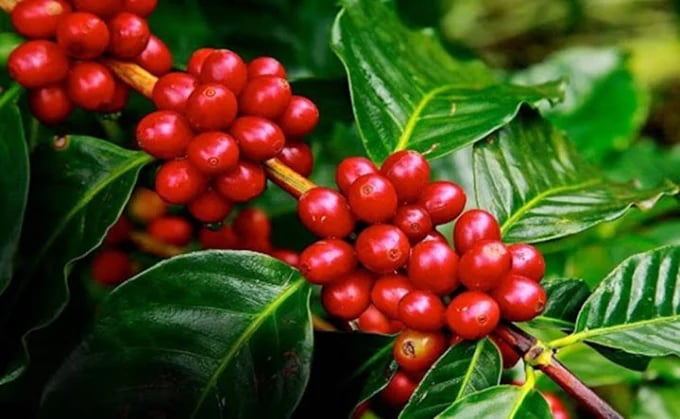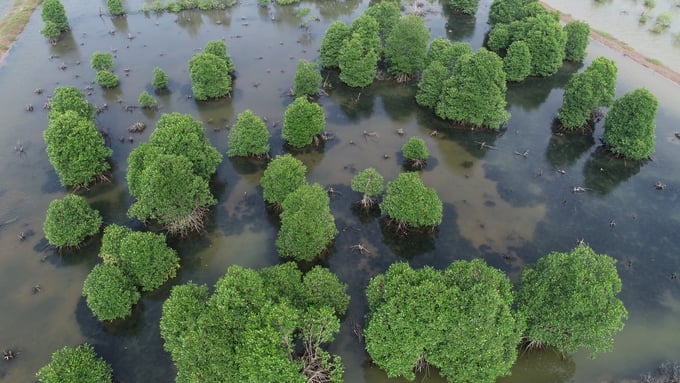June 3, 2025 | 15:12 GMT +7
June 3, 2025 | 15:12 GMT +7
Hotline: 0913.378.918
June 3, 2025 | 15:12 GMT +7
Hotline: 0913.378.918
Mr. Le Thanh Son, Business Director of Simexco DakLak Import Export Company, 2–9. Dak Lak (Simexco DakLak), Vietnam's first firm to be granted EUDR compliance certification, stated that EUDR requirements are extremely severe for coffee exports to Europe.
Vietnam's coffee exports primarily rely on the European market, with 60% of total production sent to this market. Currently, European rules are fairly severe, particularly in two areas: forest protection coffee and carbon emission reduction.
Mr. Son stated that by 2035 and 2050, products must no longer emit carbon. This requirement applies to Vietnamese coffee goods as well as all other agricultural products.

Currently, Europe's requirements are very strict, especially for two criteria: anti-deforestation and anti-carbon emission coffee. Photo: TL.
According to Mr. Son, Simexco DakLak exports 120,000 tons of coffee and 10,000 tons of pepper per year, generating over 275 million USD, or nearly 7,000 billion VND. Simexco DakLak now operates three factories: one in Binh Duong and two in Dak Lak.
Furthermore, Mr. Son says that the recent coffee season has seen a significant increase in pricing, from 45,000 VND/kg in 2023 to approximately 140,000 VND/kg today. Such unexpected price increases have caused numerous businesses to "renege" on promises, failing to deliver items as planned.
In the face of these difficulties, Mr. Son recommended that the state requires laws and sanctions to stabilize the domestic coffee market, "not just making commitments and then not implementing them."
Furthermore, according to Mr. Son, Vietnam's coffee exports are currently primarily dependent on the European market. As a result, the Ministry of Industry and Trade should prioritize more activities to promote trade with emerging markets such as China, India, and Japan to reduce overreliance on the European market, as not all coffee exporting enterprises, such as Simexco DakLak, meet EUDR and European carbon emission criteria.
Mr. Vu Ba Phu, Director of the Agency of Foreign Trade (Ministry of Industry and Trade), stated that the Ministry of Industry and Trade organizes many delegations to participate in trade fairs in China each year, particularly in Nanning, Kunming, Chongqing, and Shanghai, as part of the National Trade Promotion Program.
Vietnam has always had a national pavilion at these three trade fairs, and many significant Vietnamese coffee companies participate.
"China is a vast market, and the younger generation, in particular, is growing its use of coffee. However, we also require a whole different approach to trade promotion; we must form relationships or have our 'core' partners in China. They must collaborate with us to build the market and perform marketing, rather than merely selling to China," Mr. Phu stated.
Mr. Phu stated, "Simexco DakLak Import Export Company 2 - 9 Dak Lak has only exported green coffee beans thus far. If they have processed coffee products, China could be a viable market. If the company needs to locate partners, the Trade Promotion Agency is ready to help, search, and link them through Vietnam's trade mission system and trade promotion offices in China.
Regarding Simexco DakLak's achievement of becoming the first to gain EUDR certification, Mr. Phu believes that this is a significant milestone in market development, particularly in meeting the EU's new criteria.
Concerning the concerns of enterprises, including Simexco DakLak, Ms. Tran Nhu Trang, National Representative of the Swiss Import Promotion Programme (SIPPO), stated that EUDR is a new rule of the European Union that is quite strict.
EUDR can affect up to twelve agricultural items. SIPPO believes EUDR will have a stronger impact in Vietnam because some products, such as seafood, have yet to be listed. Shrimp aquaculture in mangrove forests, for example, is associated with forests and hence must adhere to EUDR standards.

Shrimp raised in mangroves is also related to the forest, which must also comply with EUDR regulations. Photo: Hong Tham.
She said: "The current regulations of the EU may not be fully understood by businesses in terms of specific requirements, and it is indeed very difficult and challenging to demonstrate compliance with these requirements."
Ms. Trang believes that firms must innovate in order to make their products marketable. The EU's sustainability standards are extremely severe, and many consumers are currently unsure what to do.
The trend in Europe reveals that buyers prioritize various certifications that assist firms and suppliers in meeting requirements, rather than enterprises needing to invest in certification processes and proof of compliance themselves.
According to Ms. Trang, sustainability criteria in other markets closely resemble European ones.
For example, carbon measurements. Ms. Trang stated that there are existing rules in Vietnam for Scope 1 (direct emissions from fuel consumption by enterprise-owned assets) and Scope 2 (indirect emissions from third-party energy purchases). However, in the United States, the Securities and Exchange Commission requires publicly traded corporations to report even Scope 3 (indirect emissions from the supply chain). Currently, Vietnam lacks advice on how to measure Scope 3, making it impossible for Vietnamese businesses to comply quickly.
Ms. Trang, on the other hand, believes: "On the contrary, if businesses grasp these requirements and actively seek solutions and tools for measurement and are accepted by buyers, this becomes a competitive advantage for the business."
In terms of staying ahead, Ms. Trang noted Vinamilk's recent receipt of two certifications: Sustainable Dairy Product and Net Zero Dairy Product, which took them ten years to accomplish. This demonstrates the ability to recognize and remain ahead of trends.
Ms. Trang believes that organizations must understand and keep ahead of trends and identify target customers. Even within the same market, buyer categories vary. It is critical to understand what information each customer demands, what certifications to establish sustainability, and the various levels of sustainability standards.
"The existing sustainability criteria in Europe are extensive and rigorous. SIPPO must monitor new standards and compliance methods weekly and monthly, assisting partners in grasping the information. Ms. Tran Nhu Trang, National Representative of the Swiss Import Promotion Programme (SIPPO), stated that localities and businesses should follow suit to have a prepared strategy.
Translated by Linh Linh

(VAN) VAAS and numerous Vietnamese enterprises have signed cooperation agreements with Japanese partners to promote agricultural technology and trade connectivity.
/2025/05/29/5625-12-214801_567.jpg)
(VAN) Provincial mergers in the Mekong Delta promise to streamline administration, expand inter-provincial raw material areas, and foster close linkages in agricultural value chains, benefiting both businesses and cooperatives.

(VAN) Merging Mekong Delta provinces contributes to the expansion of agricultural raw material areas, addressing previous constraints caused by provincial boundaries. Additionally, this expansion will reduce costs and strengthen linkages between businesses, cooperatives, and farmers.
/2025/05/29/1043-2-153730_145.jpg)
(VAN) The Government's policy to merge provincial-level administrative units opens up major opportunities for the Mekong Delta region to reshape its agricultural development strategy toward large-scale production, effective regional linkages, and sustainability.

(VAN) The mutual export of agrifood products between the European Union (EU) and the United Kingdom (UK) must occur again without certification, border controls or other red tape. This was agreed at the UK-EU summit.
/2025/05/22/5121-2-173645_677.jpg)
(VAN) NBSAP Tracker identifies strengths and areas for improvement in the National Biodiversity Strategy, based on each region’s priorities and capacities.

(VAN) The draft amendment to the Circular on rice export trading stipulates a periodic reporting regime for rice exporting enterprises.